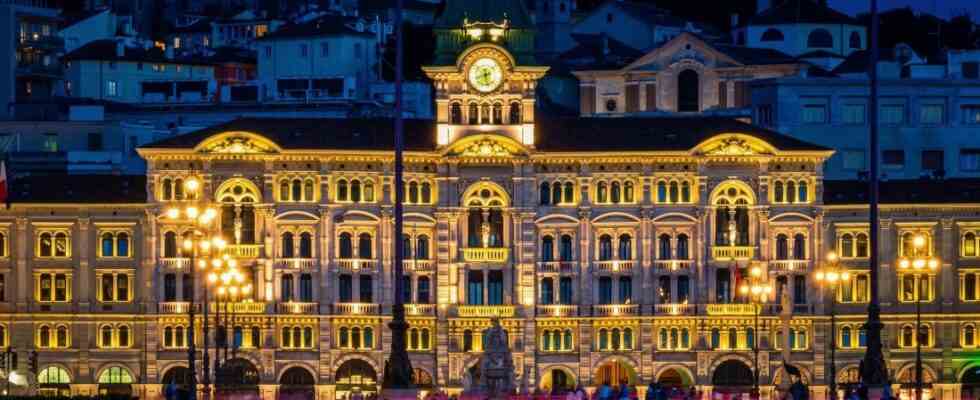Here the German title is exceptionally a stroke of luck. “Gekrümmte Zeit in Krems” was simply translated from Italian and yet seems much more powerful than the original, “Tempo curvo a Krems”: Through alliteration and consonance, the name of the town on the Danube and the term from the theory of relativity seem made for each other. Central Europe, the major theme of the Trieste Claudio Magris, meets the space-time curvature, Einstein’s discovery, which, despite all its complexity, becomes all the more interesting the more the end of one’s own life comes into view. After all, it is able to feed the adventurous fantasy that we are perhaps not inescapably chained to the linear time axis, that before and after, cause and effect only follow one another mercilessly in our limited view of things, in short: that the laws of the universe give us more leeway could than we dare to imagine.
The title story in Magris’ collection of stories revolves around this topic, in which the narrow format already seems like a statement: the writer and literary scholar, born in 1939, is not one of those who becomes more and more communicative with age. As a melancholic, he reacts to the demands of the last phase of his life with taciturnity and conciseness, ostentatiously demonstrating that interest in extensive fiction has given way to striving to perfect intellectual and linguistic composure. And that whoever wants to meet the narrator Magris has to put up with the essayist, even in the short form, because no more time can be wasted on separating the two.
With increasing urgency, he is concerned with the step-by-step, most dignified retreat possible
The protagonists of the five stories are old men, Italians with bourgeois or intellectual biographies, shaped by the upheavals of the early 20th century, by wars, racial persecution, flight and migration. Four of them live in Trieste, the fifth has found his last home in Piedmont. They are not Magris’ contemporaries, because some of their youth took place during the Habsburg period. It’s as if the author has sent them ahead to explore what he himself is increasingly concerned with: the gradual, most dignified retreat that amounts to the “great farewell to reality.”
Claudio Magris was born in Trieste in 1939 and was a professor of modern German-language literature there until his retirement in 2006.
(Photo: Jens Kalaene/picture alliance/dpa)
The stories condense this attitude towards life in snapshots, in scenes that give the main characters a reason for a retrospective, show them what has happened to them, what they have achieved or missed, suffered or recognized too late. The amount of strength that the individual has to expend in order to break away from the past is as varied as the balance sheets.
After selling his companies, an industrialist treats himself to the pleasure of working incognito as a porter in one of his properties
This is best achieved by the rich industrialist who once immigrated from Moravia, who, after selling his company, allows himself the pleasure of working incognito as a doorman in one of his properties. He, the former despot and strategist, no longer has to give orders and suddenly feels free, “just curious and no longer pressed by things”. In the quiet porter’s lodge of a building from the 1940s, he escapes the demands of his family, enjoys informal encounters with the residents of the house or the postman and does small manual work. “Now the world was,” it says, “a dog that could no longer bite him, but romped and played with him.” And Claudio Magris describes this late lightness of being against the background of the old town by the sea so attractively that one feels something like longing for such an old age.
Claudio Magris: Crooked time in Krems. Novel. Translated from the Italian by Anna Leube. Hanser, Munich 2022. 96 pages, 20 euros.
The situation of the aged Jewish writer, who lives in a poor boarding house in Lu Ferrato in Piedmont and is allowed to appear at literature prize events as a guest of honor and “genius loci”, is more difficult. Or that of the retired music teacher, who came to Trieste before the Second World War as the son of Polish Jews and later returned there after an odyssey through Palestine and America: the reunion with his violin student, a scion of the wealthy Trieste society who had achieved fame as a virtuoso and who composed a “Homage to the Jewish Tragedy” brings back painful memories. A literary scholar, survivor of World War I, is confronted with painful reminiscences while filming the film adaptation of a novel written by his childhood friend. And the Kafka expert, who is told at a conference in Krems that the lover of his school days, whom he adores from afar, is said to have had a real relationship with him, gets “greatly confused” by speculation about crooked time, simultaneity and eternal recurrence.
The stories are short, but their atmosphere and subtle irony are revealed more and more with repeated reading, so that you could spend more time with this booklet than with many novels. The translation would have done well in some places a little more time. But those who are not yet in the process of withdrawing from the world experience time primarily as an acceleration that one has to submit to. The theory of relativity also includes the observation that a clock on the edge of a rapidly rotating disk runs slower than one that is close to the center. This can be transferred to Magris’ figures: only at the very edge, just before being thrown out, does the stillness for reflection set in. The small late work, which opens up surprisingly wide spaces, bears this peculiar tension.

